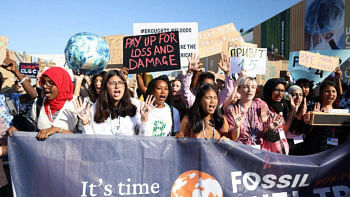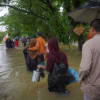A radical economic shift is needed to save the planet

At The New York Times Climate Forward, an event held in New York in September this year that discussed the climate threats faced by Bangladesh, Chief Adviser Prof Muhammad Yunus was quite direct in saying that the current economic system is driving global environmental destruction and climate breakdown. This is a remarkable stance given that only a handful of world leaders dare to call out the big elephant in the room or even discuss this inconvenient truth.
Yunus termed the current economic framework "wrong" because it rewards destruction. The fundamental problem, according to him, is that modern economies are built around one destructive principle: maximising profit, even at the expense of the environment. The endless cycle of "buy, buy, buy" inevitably leads to waste, which is the very engine of the economy, while it's also driving environmental and climate crises. Every purchase fuels the fire that's burning down our home. For example, deforestation may contribute to an increase in the GDP, but it destroys ecosystems too. Similarly, tiger prawn farming in Bangladesh's southwestern coastal districts, promoted for export earnings, has wreaked havoc on the environment and local livelihoods by increasing soil salinity. This illustrates how destructive practices are justified in the name of economic growth, even as they threaten the very foundations of sustainable life and livelihood.
In the relentless pursuit of profit in our current economic structure, we ignore the immense cost of the environmental damage being inflicted on the planet. Six out of the nine planetary boundaries—critical thresholds that keep Earth habitable—are already overshot beyond their safe operating limits. These boundaries are interconnected, meaning a breach in one area, such as change in land use, affects other areas such as climate change, biodiversity loss, freshwater contamination, etc. This interconnectedness underscores the urgent need to rethink how we design our economies, lifestyles, and consumption patterns that can have positive effects across these nine boundaries, not just reduce greenhouse gas emissions to limit climate change. If the breach of these boundaries stays long beyond their safe limits, the future of our planet is in jeopardy.
The chief adviser also noted that the current economic model has created staggering wealth inequality: a tiny group of elites are hoarding unimaginable wealth while the majority struggle to survive. The richest one percent has more wealth than the bottom 95 percent of the world population. In Bangladesh, both income and wealth inequalities have been exacerbated over the years; the top 10 percent of the population controls 41 percent of the country's total income, while the bottom 10 percent earns a measly 1.31 percent. It's a disgraceful and dangerous imbalance, and Yunus didn't shy away from calling out this disparity a "shame." His critique extended to the Paris Agreement, which he believes will fail as long as we operate within the same flawed profit-driven economic framework, which will never save us from ecological collapse as it is hardwired for failure. The so-called solutions we're pursuing currently—green growth, incremental reforms, greenwashed policies, non-binding international agreements, etc—are nothing but Band-Aids slapped on a gushing wound.
Growth and consumption cannot continue infinitely on a planet with finite resources; hence, GDP is not the right reference for us—it's a broken measure of success that celebrates destruction. Experts like Jason Hickel, who is a proponent of degrowth, argue that beyond a certain point, GDP growth is no longer correlated with well-being, particularly in wealthy nations in the Global North. Giorgos Kallis and others argue that the current consumption level and growth projections in the Global North will make it impossible to meet the Paris Agreement's goal to limit global warming to 1.5 degrees Celsius. Several reports and scientific models support this grim forecast that our current global effort is far off the track in limiting temperature rises. Continuing along the current trajectory, even with green growth, will lead to warming far above two degrees Celsius, threatening ecological collapse and the sixth mass extinction.
What, then, is the way out of the current destructive economic model? It's simple: we need to discard GDP growth as the sole measure of progress and adopt a more holistic indicator that accounts for social, ecological and economic well-being. Beyond GDP or well-being, the approach to development that prioritises equality and holistic progress, rather than simply increasing wealth for a select few, is gaining traction among economists and experts in other fields, who are calling for a new measure—one that values human well-being and planetary health over the bloated bank accounts of billionaires.
In Bangladesh, a student-led mass uprising has brought the Yunus-led interim government to power. They enjoy a broad mandate to implement sweeping reforms to rebuild the nation. Unlike elected political governments, which are less likely to pursue such reforms for transformative change, the interim government has a unique opportunity to lay the groundwork for a new economic system that Yunus called for at The New York Times event.
By establishing a commission on "well-being economy," the interim administration could lead the charge in developing a new metric to replace GDP as the primary measure of social, economic, and political progress. The chief adviser has influential friends and allies around the world, who would be ideal candidates to serve on such a commission. A new economic system focused on social, ecological, and economic well-being—rather than GDP growth that exacerbates inequality, environmental degradation, and climate breakdown—could align with the hopes and aspirations of 17 crore people of the country, paving the way for a truly new Bangladesh.
Shamir Shehab is a public policy analyst focused on the intersection of climate change, environmental sustainability, and development. He is managing partner at Catalyzing Sustainable Transformation (CaST) Network.
Views expressed in this article are the author's own.
Follow The Daily Star Opinion on Facebook for the latest opinions, commentaries and analyses by experts and professionals. To contribute your article or letter to The Daily Star Opinion, see our guidelines for submission.


 For all latest news, follow The Daily Star's Google News channel.
For all latest news, follow The Daily Star's Google News channel. 









Comments